 This is not cinema for the ages but I think it’s worth seeing, both for the pretty standard superficial but satisfying uplift narrative (irrepressible young people with crappy lives in a dead-end town bond and find some joy in creativity) and more importantly for starting much more interesting conversations about cultural appropriation and representation. Patti Cake$ is a white girl who wants to rap, or rather, more specifically, who wants to be a rap star. Her hero is the kingmaker rap star O-Z, who is black. Now, if Patti were a rich and skinny white girl from Beverly Hills or Tribeca, you’d be hating on her already for trying to appropriate black rap culture for herself. But she’s overweight and working poor from sludgy New Jersey, which maybe leads you to suspend that snap judgment and root for her instead? Maybe you think of her as a human being who loves the music, has some talent, and deserves a break and you hold back from unloading the Iggy Azalea critique on her? (Side note: Danielle Macdonald is also Australian.) Or maybe you don’t, maybe you point out that she treats both of the two black males she encounters — one of them very powerful, the other powerless — as owing her something, and that also — ahem — she’s not a very good rapper. In the end, the movie finds a middle way through this thicket which I could easily spin as a self-excusing cop-out or as insightful, inclusive, and respectful. Check it for yourself and see what you think. Oh finally just need to add that I love Bridget Everett so much.
This is not cinema for the ages but I think it’s worth seeing, both for the pretty standard superficial but satisfying uplift narrative (irrepressible young people with crappy lives in a dead-end town bond and find some joy in creativity) and more importantly for starting much more interesting conversations about cultural appropriation and representation. Patti Cake$ is a white girl who wants to rap, or rather, more specifically, who wants to be a rap star. Her hero is the kingmaker rap star O-Z, who is black. Now, if Patti were a rich and skinny white girl from Beverly Hills or Tribeca, you’d be hating on her already for trying to appropriate black rap culture for herself. But she’s overweight and working poor from sludgy New Jersey, which maybe leads you to suspend that snap judgment and root for her instead? Maybe you think of her as a human being who loves the music, has some talent, and deserves a break and you hold back from unloading the Iggy Azalea critique on her? (Side note: Danielle Macdonald is also Australian.) Or maybe you don’t, maybe you point out that she treats both of the two black males she encounters — one of them very powerful, the other powerless — as owing her something, and that also — ahem — she’s not a very good rapper. In the end, the movie finds a middle way through this thicket which I could easily spin as a self-excusing cop-out or as insightful, inclusive, and respectful. Check it for yourself and see what you think. Oh finally just need to add that I love Bridget Everett so much.
All posts filed under “Movies”
I, Tonya, Craig Gillespie (2017)
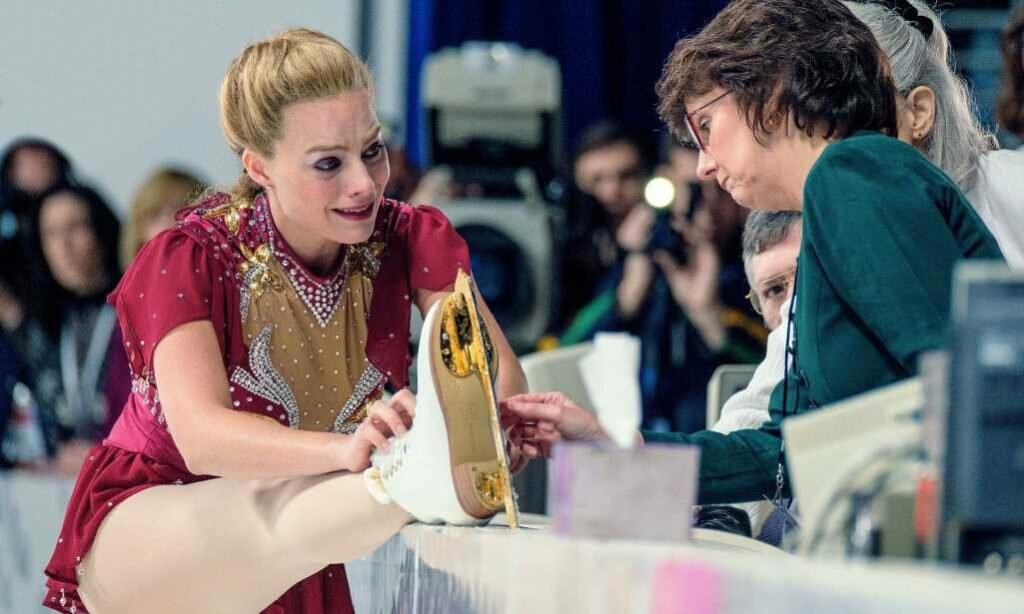 Not an easy movie to like, but I did wind up respecting it. Gillespie presses the Verfremdungseffekt very hard, constantly deflecting the current of the story’s ample pathos with direct addresses into the camera, ruined moments of narrative tension, careening edits which end not in climax but sputters. It’s very intense and fast in the modern way, the tendernesses quick and cheap and fleeting, a constant oscillation of giddiness and violence. It’s a coincidence that I saw this so soon after seeing The Florida Project but I thought a lot about the similarities, poor whites desperate to escape through (or into) magic. Gillespie occasionally comes close to letting us read this as a farce instead of a tragedy and those are the moments I most resented. If you think this is a comedy you’re doing it wrong.
Not an easy movie to like, but I did wind up respecting it. Gillespie presses the Verfremdungseffekt very hard, constantly deflecting the current of the story’s ample pathos with direct addresses into the camera, ruined moments of narrative tension, careening edits which end not in climax but sputters. It’s very intense and fast in the modern way, the tendernesses quick and cheap and fleeting, a constant oscillation of giddiness and violence. It’s a coincidence that I saw this so soon after seeing The Florida Project but I thought a lot about the similarities, poor whites desperate to escape through (or into) magic. Gillespie occasionally comes close to letting us read this as a farce instead of a tragedy and those are the moments I most resented. If you think this is a comedy you’re doing it wrong.
Ketchup 2018
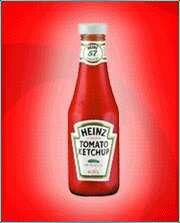 Argh I’m just awful at keeping up with this. These are things I remember from 2018 so far. Maybe I’ll be better in the summer about making a note here and there.
Argh I’m just awful at keeping up with this. These are things I remember from 2018 so far. Maybe I’ll be better in the summer about making a note here and there.
Music
- Ctrl, SZA
- Until the Hunter, Hope Sandoval
- Alone, Mall Grab
- Elder Island, Elder Island
- Con todo el mundo, Khruangbin
- Freedom, Amen Dunes
- Mind Out Wandering, Astronauts, etc.
- Pop 2, Charli XCX
- Tell Me How You Really Feel, Courtney Barnett
- Halcyon Digest, Deerhunter
- Scary Hours, Drake
- Places and Spaces, Donald Byrd
- Gabor Szabo
- Lord Echo
- Czarface Meets Metalface, MF Doom
- War & Leisure, Miguel
- SR3MM, Rae Sremmurd
- These Falling Arms, The Sea & Cake
- Treehouse, Sofi Tukker
- Exotic Worlds and Masterful Treasures, Stimulator Jones
- Sugar at the Gate, TOPS
- In a Poem Unlimited, U.S. Girls
- Big Fish Theory, Vince Staples
- William Onyeabor
- Provider, Frank Ocean
Required reading
- Bluets, Maggie Nelson
- Pale Fire, V. Nabokov – Students always love this
- Olio, Tyehimba Jess – Most impressive new poetry book in years
- Flaubert’s Parrot, Julian Barnes
- Invisible Cities, Italo Calvino – Students always love this
- If Not, Winter: Fragments of Sappho, Anne Carson (and Sappho sort of)
- Meadowlands, Louise Gluck
- The Picture of Dorian Gray, Oscar Wilde
- Wide Sargasso Sea, Jean Rhys – So magically good; her handling of time and tone is amazing
- On Being Blue, William Gass – Did not remember the fundamental sexism in this; was embarrassed to have assigned it to students
Non-required reading
- L’Amour Fou, Rosalind Kraus – Finally thought to buy myself a copy of this much beloved work on surrealist photography
- The Line of Beauty, Alan Hollinghurst – Very smart but I don’t love it like Wendy does
- Meditations, Marcus Aurelius – A little bit every workday instead of alazopram
- Speak, Memory, V. Nabokov – Sometimes the pleasure VN takes in his own virtuosity makes me roll my eyes but this is just incredible in every way as a memoir, a history of 20c, and a string of blue ribbon sentences
Movies
- Man of the West, Anthony Mann. I love how Mann does violence. There are no clean punches or shots, it’s all awkwardness and it goes on too long or not long enough to effect any catharsis. Grueling. Lee J. Cobb, Julie London, Gary Cooper. Movie Night! With Scott and Shrode.
- Darkest Hour, Joe Wright. Movie Night! With Scott and Shrode. Watched and forgotten.
- Call Me By Your Name, Luca Guadagnino. I guess if it’s sufficiently continental it’s OK that it’s predatory pedophilia?
- Winchester ’73, Anthony Mann – The western where the rifle is the star
- Stagecoach, John Ford – Everything’s going to be all right as everyone knows his/her place
- The Gleaners and I, Agnes Varda – Still the greatest
- Faces/Places, Agnes Varda – Also good but here as opposed to the Gleaners it feels a little bit like the openness to chance is slightly pre-determined? I like the part when they go to Godard’s house and he’s such an asshole
- North by Northwest, Hitchcock – Movie night! With Scott and Shrode. For some reason we drank a lot of ouzo.
- The Florida Project, Sean Baker. – Baker wants to get into some serious shit here regarding American poverty and hopelessness, but he also wants to make a kandy-kolored adorable movie about hope and the irrepressibility of the imaginative lives of children, and he can’t really have it both ways. If it ended in tears and agony instead of E. T. transcendence I would respect it more. Still this is worth seeing and I’m glad it got made.
- Seeing Allred, Sophie Sartain, Roberta Grossman. This is a Neflix documentary about Gloria Allred and she is a badass.
- Wind River, Taylor Sheridan. I’m sorry, this is bullshit. The movie is well made and earnest in its desire to condemn racism, government ineptitude, and corporate malfeasance but why why why must the lady FBI agent be incompetent, the Native Americans noble but hapless, and the only person capable of setting wrongs right a white guy? I fear I know the answer to that: If the Jeremy Renner character were played by a Native American actor, the movie would never have been made, because no one’s going to stomach watching a Native American hero coolly pick off the white bad guys. Ugh.
TV
- Big Little Lies (HBO)
- Silicon Valley (HBO)
- Babylon Berlin (Netflix)
- The Crown (Netflix)
- Narcos (Netflix)
- The Same Sky (Netflix)
- Nobel (Netflix)
- The Tunnel (Amazon)
- Atlanta (FX)
- Bosch (Amazon)
- The Expanse (Amazon)
- Prime Suspect: Tennison (Amazon)
I watch a shocking amount of television these days but I don’t know how much I’m really watching it since I’m usually doing email at the same time. Any of these will provide a reasonable amount of ambient narrative if you’re in need of that kind of thing, but Atlanta‘s the only show there that’s actually worth thinking about.
Ketchup 2017
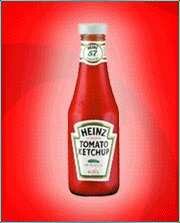 I’ve got a phone, a tablet, a laptop, a desktop, and a TV in my house, and any one of them is capable of delivering torrents of video from a variety of sources. A fly on my wall would note my oddly contradictory responses to this cornucopia. On the one hand, I’m an indiscriminate Hoover, in that I’ll start watching just about anything. On the other hand, I seem to have become increasingly discerning, or distractible, in that I am rarely sufficiently engaged to finish anything. I watched one third of The Young Pope, only to be distracted by the appearance of the new season of Orange is the New Black, which I got halfway through before being suddenly struck by an inexplicable need to see all of Bertolucci again, a project I abandoned almost immediately after reading somewhere that I should instead be watching Paolo Sorrentino’s movies, which reminded me that I never finished The Young Pope, but when I tried to go back to it I somehow instead spent a whole week watching the first twenty minutes each of a hundred subtitled European cop shows on Netflix.
I’ve got a phone, a tablet, a laptop, a desktop, and a TV in my house, and any one of them is capable of delivering torrents of video from a variety of sources. A fly on my wall would note my oddly contradictory responses to this cornucopia. On the one hand, I’m an indiscriminate Hoover, in that I’ll start watching just about anything. On the other hand, I seem to have become increasingly discerning, or distractible, in that I am rarely sufficiently engaged to finish anything. I watched one third of The Young Pope, only to be distracted by the appearance of the new season of Orange is the New Black, which I got halfway through before being suddenly struck by an inexplicable need to see all of Bertolucci again, a project I abandoned almost immediately after reading somewhere that I should instead be watching Paolo Sorrentino’s movies, which reminded me that I never finished The Young Pope, but when I tried to go back to it I somehow instead spent a whole week watching the first twenty minutes each of a hundred subtitled European cop shows on Netflix.
I’m grateful that there are a lot of interesting things to watch, but this lurching from one thing to the next is unpleasantly disorienting. I don’t like it when I’m at the gym in the morning and I literally can’t remember what I watched the night before. (It’s possible that my sense of being overwhelmed and confused by this tsunami of content is exacerbated by early onset CRS.) I don’t like the sense of having so many things unfinished. It’s begun to affect my reading habits as well. I only ever used to have one book by my chair; now there are six.
So some New Year’s resolutions for 2018.
- I’ll finish what I start, unless it’s awful, in which case I’ll abandon it quickly and decisively, never to return
- I’ll watch more movies and fewer TV programs, which have a way of just burbling on forever
- I won’t watch anything so wholly without merit that it doesn’t warrant at least a brief comment on this blog
Before beginning this new program, I should quickly note some cultural products consumed this fall which I haven’t written about here and likely won’t. This is by no means a complete list; this is just what I can remember off the top of my head this morning.
Movies
- Dunkirk, Christopher Nolan (2017). Just watched this with Shrode when he came through town on his way to New Orleans. Impressive, exhausting.
- Force Majeure, Ruben Östlund (2014). If this doesn’t convince you that rich people are insufferable I don’t know what will.
- Landline, Gillian Robespierre (2017). Charming but not as good as Obvious Child.
- The B Side: Elsa Dorfman’s Portrait Photography, Errol Morris (2017). O sublime. I had a very profound but kind of hard to explain reaction to this movie.
- The Accountant, Gavin O’Connor (2016). I saw this on a plane I think. I remember it because the guy’s an accountant, but also, like, has guns.
- Gold, Stephen Gaghan (2016). I am still a Matthew McConaughey fan, despite everything.
- The Right Stuff, Philip Kaufman (1983). I like Sam Shepard’s mysticism.
- The Meyerowitz Stories (New and Selected), Noah Baumbach (2017). Good lessons about how not to be an artist.
- Okja, Bong Joon Ho (2017). Wonderful. I wish I had the gumption to be a vegan.
Books
- Sailing the Wine Dark Sea, Thomas Cahill (2003). It was fun and useful to read this while teaching my classics class on Homer, Virgil, and Ovid this fall.
- On Being Blue: A Philosophical Inquiry, William Gass (1976). Preparing to teach this alongside Maggie Nelson’s Bluets in my spring class on reiteration. It’s knottier than I remembered.
TV
- A Very Secret Service, Jean-François Halin (2015-). This is on Netflix and it is really disorienting, in a good way. It’s like Get Smart meets The Battle of Algiers.
- Patriot, Steven Conrad (2015-). This is on Amazon and I don’t know what to say about it except that I love it when Kurtwood Smith talks about piping.
- Mindhunter, Joe Penhall (2017-). As I scroll through my viewing history on Netflix and Amazon, I see that I have in the past year or so started watching approximately one thousand drama series of various stripes, but seen through to the end maybe half a dozen, of which this was one. Not perfect, but strong characters, good writing, engaging mise en scene make it worth it IMHO.
- Ozark, Bill Dubuque and Mark Williams (2017-). Another series I went the distance with; I’d go most anywhere with Laura Linney.
- Curb Your Enthusiasm, Larry David. I had never really gotten into this; I watched it all this fall.
- The Deuce, George Pelecanos and David Simon (2017-). Meticulously researched and I love the idea of it but it’s really pretty flat in practice (just like Treme was).
- Vinyl, Rich Cohen, Mick Jagger, Martin Scorsese (2016). Just atrocious.
- The Young Pope, Paolo Sorrentino (2016-). As with Sorrentino’s movies, I feel like I’m too American to really appreciate it, but I love it.
- Vice News Tonight. I have become a devotee of this show; it’s the only TV news I can bear to watch.
- Justified, Graham Yost (2010-2015). I was really surprised by how much of this I watched. I watched a lot of it. It certainly trucks with a lot of stereotypes about Applalachia, but in a weird way even just to see that part of the world represented on TV felt weirdly like something positive. That, plus so many nice performances kept me on this for a while, though not all the way.
- Ballers, Stephen Levinson (2015-). This is just horrible, horrible. I watched it all. Probably the most shameful thing I did in 2017. I don’t even know why I did it.
Weekend, Jean-Luc Godard (1967)
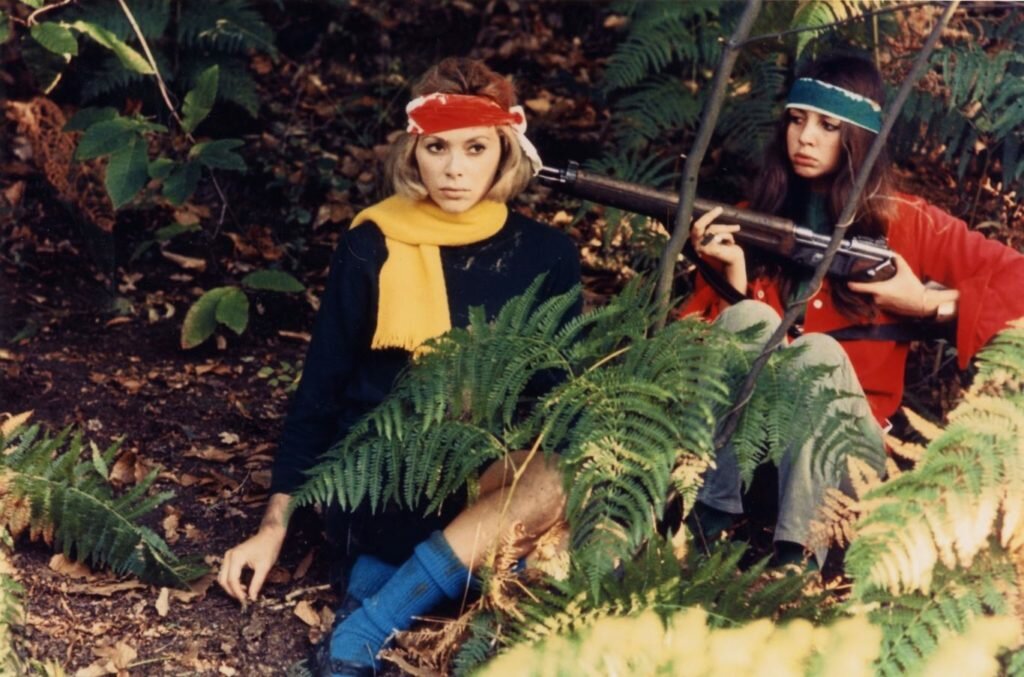
Early Godard begins with Breathless in 1960 and concludes with Weekend in 1967, with an astonishing run of eight or nine masterpieces in between. There are a lot of arty movies from this era that I learned to love in my yoot but don’t return to — I’m going to go out on a limb and wager that I probably won’t ever see Persona again in this life. But I do not get tired of these Godard movies. I think it’s because the sublimity is leavened with stupidity. Or rather the other way around. The beauty emerges in glimpses from the muck. It’s beautiful despite Godard’s clear commitment to making it ugly. No, that’s not it. It’s because they are hilarious. Maybe.
Imagine Le déjeuner sur l’herbe, but the diners are armed hippies who’ve just crawled away from car crashes, the menu is comprised of roasted bank manager and peasant-commune-slaughtered pig, and the soundtrack is a combination of frantic pop music, honking horns, and earnest readings of Mao and Saint-Just. Something like that is what you get here. We should screen this with Renoir’s Partie de campagne — that would be a hoot. If we could show them on a bedsheet at the site of Castro’s old camp in the Sierra Maestra and get J. G. Ballard to make the popcorn, that would be ideal.
Arrival, Denis Villeneuve (2016)
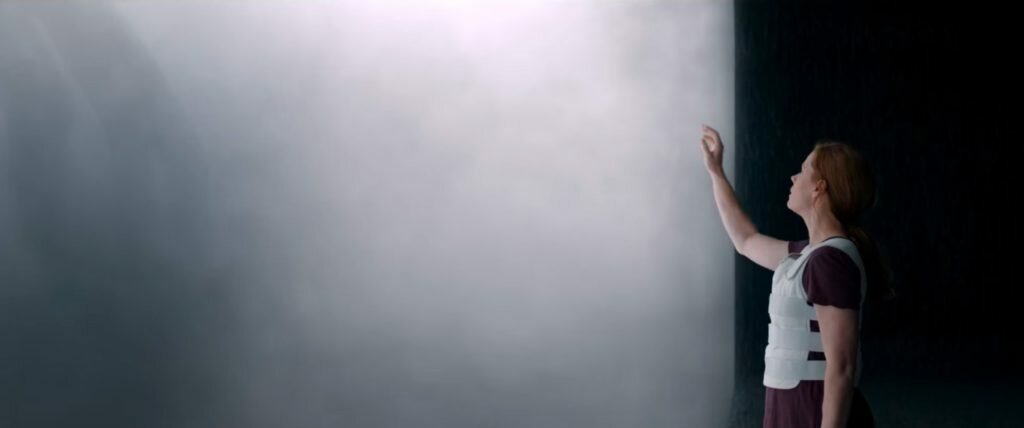
Pretty good! As with Sicario, Villeneuve is able here to maintain genre conventions in such a way as to satisfy the casual consumer of action/sci-fi, while at the same time indulging in some more associative, lyrical, and thought-provoking passages. Neither are cinema for the ages, but they are solid and intelligent films. Notice too that both feature strong female leads (as did the movie for which Villeneuve is still probably best known, Incendies, which I actually haven’t seen yet). Indeed, in the case of Arrival, the men are really nearly irrelevant except insofar as they serve as obstacles for Amy Adams to overcome. I like this Villeneuve guy’s choices, and his style is very cool.
The Rules of the Game, Jean Renoir (1939)
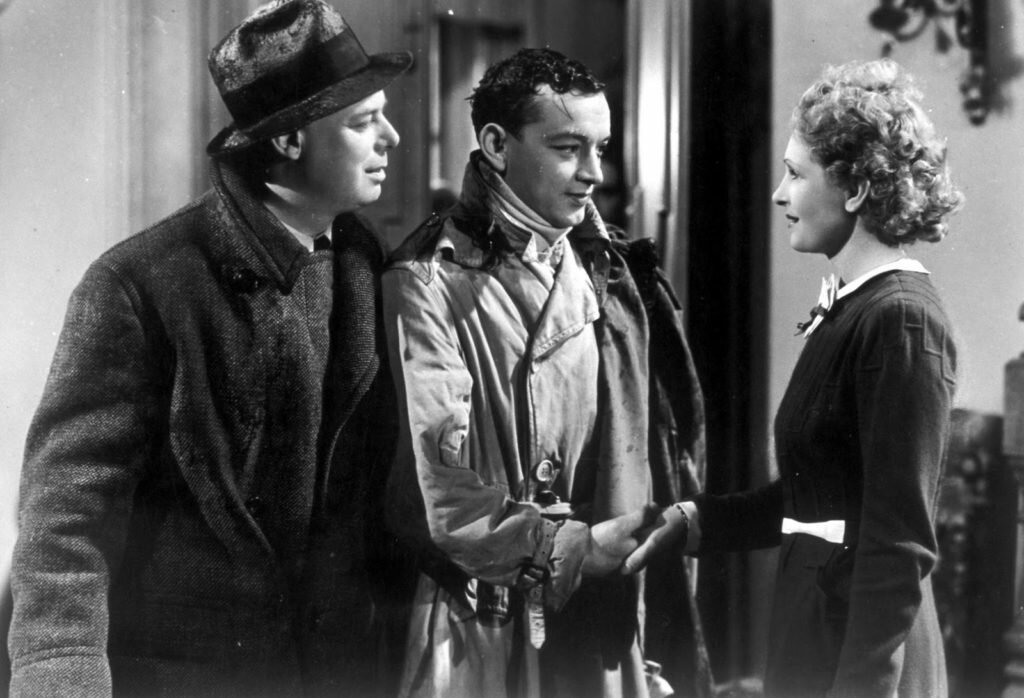 A dangerous discovery: The University library has the entire Criterion Collection available to stream. Suddenly these quiet summer afternoons in the office seem like golden opportunities to revisit old favorites.
A dangerous discovery: The University library has the entire Criterion Collection available to stream. Suddenly these quiet summer afternoons in the office seem like golden opportunities to revisit old favorites.
It’s too bad that Renoir’s Grand Illusion isn’t available through this service, because it’s the natural accompaniment to The Rules of the Game. Both films are about the fragility, or maybe the elasticity, of the conventions, taboos, and mores which govern civilized activities, whether social (in Rules of the Game) or political (in Grand Illusion). To live rigidly within those boundaries, like a cow keeping its wary distance from the electric fence, is to be doomed to dreariness: a frigid marriage, moronic jingoism. But to flagrantly transgress them is to risk chaos, alienation. The authentic life, then, is lived with one foot on either side of on an impossible and invisible line hidden beneath the snow, as seen at the end of Grand Illusion.
The Rules of the Game is an iron fist in a velvet glove. The main action takes place at a country estate, where a bunch of aristocrats are spending the weekend. On the surface it looks like a charming upstairs/downstairs melodramatic farce, with slamming doors, midnight rendezvous, stolen kisses, jealous husbands. But there’s a hard edge under the fizz. The party goes out for a hunt and Renoir subjects us to a relentless sequence of rabbit after rabbit after rabbit being shot dead in the dirt. And in the end, innocence itself lies down with them.
Renoir, famously, called The Rules of the Game a war movie, and indeed the alliances and enmities of the feckless aristocrats and territorial servants who populate the film are easily understood as metaphors for the pettinesses which were, in 1939, about to destroy a civilization.
All that, yes, but the movie’s no dirge; it’s French, and so is also filled with joy that literally makes me laugh out loud. And, far from least, this is the movie where one learns the proper method of making salade de pommes de terre. Crucial.
Lacombe Lucien, Louis Malle (1974)

Lucien is a young farm hand in rural France, hardworking, not too bright. It’s 1944 and the Allies are advancing from Normandy. If Lucien hadn’t had the bad luck to live at such a fraught moment in history, he probably would have just gone on shooting rabbits, ploughing the fields, and been just fine. Alas.
Lucien’s little village is under strict and orderly occupation, but panic and hysteria lies just beneath the surface of every interaction. The Jews in hiding fear deportation, the collaborators fear their time is nigh, the resistance fighters fear discovery.
Lucien tries to join the resistance and is rebuffed on account of his youth. In an adolescent dudgeon, he unwittingly betrays the local resistance leader to the French auxiliary to the Gestapo. These latter craven and dissolute bastards take him on as a kind of mascot.
The exquisite subtlety of the story has to do with Lucien’s fundamental misunderstanding of how power works. For example, he thinks he has power over a girl, but when other guys can dance with her and he doesn’t know how, it confuses and enrages him.
His most dangerous misunderstanding concerns that girl and her family, who are Jewish and in hiding in the town. He thinks the power he has from the sanction of the collaborators enables him to force the family to do his will, but he also thinks he has the power to protect them.
The movie resonates at this historical moment, where we see a lot of people acting as if being in power at the moment entitles you to do whatever brutal and stupid things you like. Even things which in the long or not-so-long run are going to bring woe mainly to yourself.
Devastating but totally understated, with gorgeous performances throughout. Watch it.
Ketchup
 Once school lets out, I start consuming culture faster than I can respond to it, so I need to quickly catch up with notes on a few books and movies.
Once school lets out, I start consuming culture faster than I can respond to it, so I need to quickly catch up with notes on a few books and movies.
The Underground Railroad, Colson Whitehead (2016). I was really disappointed by how disappointing this was; it sounded so terrific in the reviews. The fantastical/speculative elements don’t engender much surprise, the characters are wooden, the set pieces go on too long and belabor their points, the movement through time and space is frequently herky-jerky and confusing, and worst there’s an air of bland, austere dutifulness hanging over the whole enterprise. I don’t think I’m someone incapable of appreciating a novel of ideas, but I guess I do like a little style thrown in after all.
The Sympathizer, Viet Tranh Nguyen (2015). This was terrific, a timely tour de force for our era of heightened consciousness about who gets to speak for whom in literature. This slyly provocative novel features a double agent whose identity, politics, and identity politics are so scrambled he himself can’t say where he really belongs. The subtle arguments about nationalism, culture, and determinism come wrapped in a crisp, lively, dead-on rendering of the period. Smart and fun so rarely go hand in hand.
Love & Mercy, Bill Pohlad (2014). Enjoyable and informative; I knew Brian Wilson of the Beach Boys suffered from mental illness, but I had no idea that he was so cruelly manipulated by his manager. Big props to the art director here; the movie’s a joy to look at and makes you feel like you’re in late 20c L.A.
Gimme Danger, Jim Jarmusch (2016). Jarmusch’s love letter to the greatest rock and roll band of all time. A bit more my speed than the Beach Boys. Iggy for President! He’s like if Bernie Sanders jumped into the mosh pit. You hear “I Wanna Be Your Dog” about a thousand times over the course of this movie and it is AWESOME every time.
Twentieth Century Women, Mike Mills (2017). I don’t know how he does it, but he does — this movie is as sweet and wistful as can be, and somehow less triggering than Beginners, which apparently annoyed me pretty bad. Do all the grand emotional turbulences between kids and parents, parents and lovers, kids and kids really just amount to a bunch of well-off over-educated white people wringing their hands? Yes, of course. But feelings are still feelings, people! Did you know Mills is married to Miranda July and they have a son named Hopper, who’s five? Once he’s old enough to skateboard over to Frances Bean’s house for a cup of matcha, that kid is going to be the most indie kid who ever lived.
Shame, Steve McQueen (2011). This Paul Schrader movie was somehow directed not by Paul Schrader but by Steve McQueen. Of McQueen’s three features to date (the other two are Hunger, about Bobby Sands, and 12 Years a Slave, about Solomon Northrup), this is the only one I’ve been able to bring myself to watch, and that’s saying something, because this one’s not exactly Chitty Chitty Bang Bang. McQueen sure has a thing for abuse. Shame features a kind of sexual shark, played by Michael Fassbender, who very literally has one thing on his mind. We see him have every variety of modern urban intercourse and none of it seems much fun at all. Predictably, he fails to get it up only once, when he meets a person — a charming and ingenuous co-worker — who registers on his tiny consciousness as a subject rather than an object. It’s all profoundly sad, but I’m not sure it’s profound.
South and West, Joan Didion (2017). You only need to check this out if you’re interested in the rural South and/or you’re a Didion fanatic; I’m both. This isn’t even really a book, it’s just a bunch of jottings Didion made on a one-month road trip from New Orleans, up through Mississippi and Alabama, in the summer of 1970. There are flashes of insight, and some classic Didion images, but most of it is pretty shallow and predictably stereotypical. I find this oddly gratifying, that the South seems to have stymied my hero’s normally inexorable acumen . . .
I’m remembering that last year at this time I was reading the Ferrante books and it was perfect. I miss them.
I’m also reading essays on photography by Robert Adams; I’m not so sure about them. He’s a bit given to hagiography of his heroes. The more I read prose by photographers the more I realize that it’s awful rare to find a photographer who can write for a damn.
Bande de filles (Girlhood), Céline Sciamma (2014) and La haine, Mathieu Kassovitz (1995)

Ah the banlieue, city of fluorescent lights in drab office buildings, mercury vapor lights in the courtyards of the projects, police flashlights shining on dark faces. I just watched Sciamma’s movie, and it led me to go back to Kassovitz’s, which I hadn’t seen since it came out — more than twenty years ago now! While Girlhood is pretty depressing (though not depressing enough; see below), I have to say that if we’re getting our news solely from these two movies, things seem to be a bit less dire in 2014 than they were in 1995.
There’s good reason not to trust that narrative, though; both of these films about the experiences of poor French of color from the projects by les honkies from film school. Be that as it may. If you categorically disapprove of privileged people writing disadvantaged characters, you’ll want to skip both these movies.
Sciamma creates a convincing world for a while, but then starts exoticizing and goes off the rails. She’s so enraptured by the beauty of these girls as they work their hustles and dance and party and catfight that she forgets to show us just how truly dangerous and dire their situations really are. A black teenager living on her own dealing drugs at street level is going to get hurt, and this movie’s fantasy that she’ll instead turn into some kind of inspired and empowered super hero is, in my view, irresponsible. But maybe I’m being too rough; check it out for yourself. And remember to watch Kassovitz’s movie, too, if you’ve never seen it. It’s like if Spike Lee was French. Sort of.
